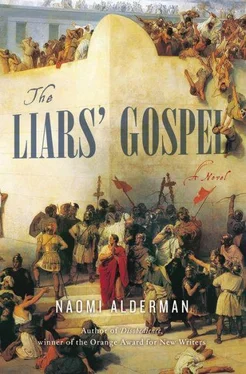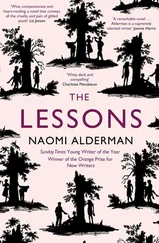“And what if I let you go?”
“My men would, of course, be delighted.”
“Yes,” says Pilate, “yes, your men. Ten thousand of them, they say, across Judea, loyal to you.”
This is not true, but Bar-Avo does not contradict him. There are nearer five thousand and they are loyal not to him but to the cause. To live free is more important than merely to live. Loyalty to him would hurt that cause. They must be willing to give him up if necessary; he would do the same to them.
“Yes,” Pilate muses, “let them taste the mercy of Rome as well as the kiss of her strap.”
The man is not an idiot, and yet he behaves like an idiot. It is pride. If another man were considering this course of action, Pilate would bring him up easily on five or six points which make it unthinkably foolish. But he cannot bring his mind to bear on his own plans.
“They would be grateful to me, would they not, if I released their master?”
“They would suspect I had turned traitor,” says Bar-Avo, because he can see the growing, gathering shimmer of the way to save his own skin.
“Hah!” Pilate smiles broadly. “Even better! Gratitude and mistrust. Magnificent. You could not have promised me anything better if you had designed it yourself.”
Bar-Avo tries to make his face as impassive as a stone. As if the thought of what he has done has hardened his heart.
“I’ll tell you what,” says Pilate, “I’ll make a game of it.”
His men are in the crowd. Bar-Avo sees them as soon as he and Yehoshuah are brought out blinking into the light of the square below Pilate’s home, the place where later on the Prefect has his soldiers massacre all those men.
They are here to see him die, perhaps. Or to start a riot, or join in with one if one starts. They mingle quietly with the crowd. The hoods of their cloaks are drawn up around their faces. There are perhaps two hundred people here and probably forty of them are his own men. Because of the respect and love they hold him. Not to try to save him, but to witness his death and bear witness of it to his friends, and to his mother, and to his wife and sons.
He sees two or three of the friends of Yehoshuah in the crowd. He had a smaller band, of course, and they were not strong men, not used to fighting or to witnessing death at the hands of Rome. He wishes more of Yehoshuah’s men were here. Such a united force should see how Rome kills. If they saw, they could not help but rise up.
Pilate addresses the crowd.
“People of Jerusalem!” he shouts. “I come here today to offer you a choice!”
The crowd stirs and mutters. He has played this little game before. He does not always do it, only sometimes. So they should not become complacent, of course.
“Your will is important to me! Rome does not wish to hurt you, only to bring you order and good governance. Therefore, I have two criminals here: the preacher Yehoshuah, who called himself the King of the Jews, and Barabbas, a rebel who murdered men during the rebellion.”
There is more muttering. Not men, the crowd are thinking to themselves, soldiers. Who do the Jews kill in a rebellion? Not other Jews. Soldiers. Even those who didn’t know that Bar-Avo had killed soldiers know it now. Pilate has as good as said: here is a freedom fighter, a hero. Does he know he’s said it? It’s so hard to tell with that man whether he’s being cunning or stupid. Or whether his cunning is the same as his stupidity, because only a stupid man would try to be cunning like that.
“I am going to allow you to decide which of these men shall live and which shall be executed. They are both criminals, both found guilty by your courts!”
But we know who influences the courts, murmur the crowd, we know who tells them whom they may find guilty and whom innocent.
“This man Yehoshuah has blasphemed against your God! And this man Barabbas has murdered men!”
But there are women in that crowd to whom Bar-Avo’s men have given bread when the Romans burned the wheat field. There are men in that crowd whom Bar-Avo’s men have fought with, defending their homes from bandits. There are children in that crowd whom Bar-Avo’s men have found medicine for. No group of guerrilla fighters can last for long without the love of the people they live among. What could Yehoshuah possibly have to compare with that? No preacher has anything to offer to an oppressed people that compares with bread and water and tinctures and swords.
“So which do you choose?” he shouts. “You can save one and only one! Which of these men will you save?”
And there’s no choice, none at all. Yehoshuah’s friends try to call for him, but there aren’t enough of them, and they’re drowned out by the voices rising up one on another on another saying, “Barabbas! Give us Barabbas! Blessed Barabbas!”
It is a pitilessly cruel game. If they refuse to call out names — and it has happened before, like gladiators refusing to fight — Pilate will simply kill both men. It is entirely unfair. It makes a mockery of life itself. And yet what can anyone do but participate?
Bar-Avo stares at Yehoshuah. Yehoshuah is looking out at the crowd, where his scattered friends are shouting themselves hoarse on his behalf. There is a man with tears streaming down his face as he shouts, “Yehoshuah! Yehoshuah!” Bar-Avo can see his lips moving, but the sound does not reach, so great is the clamor of “Barabbas! Barabbas!”
Pilate is disconcerted by the vehemence of the cries. Whatever calculation he thought he’d made, it seems to have fallen out differently from his expectation. His shoulders slope. He quiets the crowd. They settle down watchfully. He could do anything.
“But this man,” he says, “don’t you want this King of the Jews?”
And it’s clear to the crowd that he’s mocking them now. As if they’ve been left with any such thing as a rightful king, as if they’d be able to tell their rightful king when they saw him.
It is nearly one hundred years this year since Rome took hold of Jerusalem and breached her and penetrated her by force. He is asking this question as if every king for one hundred years hasn’t been placed on the throne by Rome. He despises them, and it is obvious in every word he utters.
“What shall I do with this King of the Jews?” he says.
“Execute him!” shouts someone in the crowd, and the rest take up the cry of “Barabbas!” again. The few pitiful voices calling out the other name are entirely inaudible.
How is it possible that a whole life can come down to this moment: seeing how many friends you have and how loudly they are prepared to shout your name?
Bar-Avo wants to live, he thinks, but not like this. But that is a lie. He realizes it as he stands there, with the humility of a man who has been for these past few days half dead, half alive. He wants to live and he does not much care how, as long as it does not destroy the cause he’s fought for. He and Yehoshuah are both weeping, and the preacher’s friends are still shouting his name, still desperately trying to save him, and it is obvious they love the man. If it were possible to save them both, Bar-Avo’s men would be shouting for that. If it were possible to expel the occupiers from the land by shouting, they would shout for that until their throats bled. But there is never the choice to save both. There is never more mercy than absolutely required.
A look crosses Pilate’s face, and he glances to his left and right as if he wishes he had more soldiers around him. If he were to refuse to give them Bar-Avo now, his life would be in danger. There are enough men in the crowd to rush them. Crowds have a single voice and mind and heart. This crowd wants Bar-Avo.
“Very well!” shouts Pilate. “I have heard your wishes! I hope that seeing the magnanimity of Rome will encourage you to be loyal! To love your Emperor! To stop your petty uprisings! I know that Barabbas, having felt this mercy, will join with me in longing for peace between the two great nations of Rome and the Jews!”
Читать дальше












